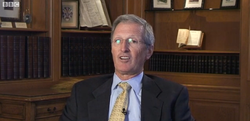 Last week, Cargill CEO Greg Page gave a rare interview to the BBC, in which viewers got to ask him some questions. Oddly, nothing was said about Cargill's scandalous recall of 16 million kilos of ground Turkey in the US in September of this year. At least one person died and 33 others had to be hospitalised from eating that meat.
Last week, Cargill CEO Greg Page gave a rare interview to the BBC, in which viewers got to ask him some questions. Oddly, nothing was said about Cargill's scandalous recall of 16 million kilos of ground Turkey in the US in September of this year. At least one person died and 33 others had to be hospitalised from eating that meat.
Questions were raised about the company's monopoly power and the role of speculation in food price volatility. Page dismissed both ideas, calling speculation a "non-event" and describing Cargill as a "messenger", linking supply and demand. For this simple service, it must be remembered that Cargill made over US$470,000 an hour in profit during the food crisis of 2008 while record numbers of people went hungry. (For a different take on speculation see this video and publication from WEED.)
Page also shrugged off the suggestion that his company is involved in the global farmland grab. "We are not landowners," says Page, "We are the processors of people's crops."
This is stretching the truth. Beyond the many sugarcane plantations, feedlots and factory farms that Cargill owns and operates, it does own farmland for crop production: at least 50,000 ha in South America through its hedge fund Black River Asset Management. And Black River, which manages some $6 billion in assets worldwide, is aggressively expanding investments on the "supply side". Earlier this year it launched a $400 million fund to invest in large-scale dairy farms in Asia and aquaculture operations in South America. Rich Gammill, managing director of Black River, says the company's farms will be established in areas where supply is provided by small peasant farmers.
"There is a huge lack of competency in farm management practices in China and India," says Gammill. "We're so used to efficient food production in the United States. But in China and India a lot of it depends on peasant farmers. It is not an optimized or efficient system and it is unsustainable to meet demand."
Perhaps this is what Page was getting at when he said he was concerned about farmland grabs because "the sociology of that will be difficult."
It sure will be. Around 70 million rural households in India – well over half of the country's total rural families – keep dairy animals and they supply near to 100% of the country's milk market. Far from being inefficient, India's peasant farmers were able to triple the country's milk production between 1980 and 2006 and today they produce enough milk to meet the demand in the country at a fraction of what it costs farmers in Europe and North America. They are unlikely to roll over and let a multinational like Cargill come in to steal their livelihoods.
GRAIN asked Brewster Kneen, the world's foremost expert on Cargill, for his take on Page's interview. Here's what he said:
"You don't get to be top dog in Cargill by being careless. Greg Page knows his corporate line very well, and it is summed up in the company slogan of 'providing solutions'. So Cargill is the middleman, as Page innocently says, taking the price asked for a crop and finding a customer for it at that price. To facilitate this, Cargill teaches farmers - whether in Ivory Coast, Zimbabwe or Arkansas, how to grow and harvest the crops Cargill desires, and how to improve their quality. (There is no mention of Cargill's recent food safety scandals) There is no talk of agro-ecology or water conservation or genetic diversity etc. Of greater interest to Cargill, as Page describes it, are price distortions caused by government interference, either in the form of subsidies to farmers, which Page oddly attributes to Third World governments, not the USA or Europe, direct government interference as when Russia, faced with a severe crop failure two years ago, stopped all exports, and trade policy generally. Cargill's solution to global food security: 'trust-based free trade in food'. Its as simple as that -- as long as you glide smoothly over (not to say dismiss) issues such as corporate control of seeds, genetic engineering, and land grabs as Page does in this interview."
The BBC interview with Greg Page can be viewed here: